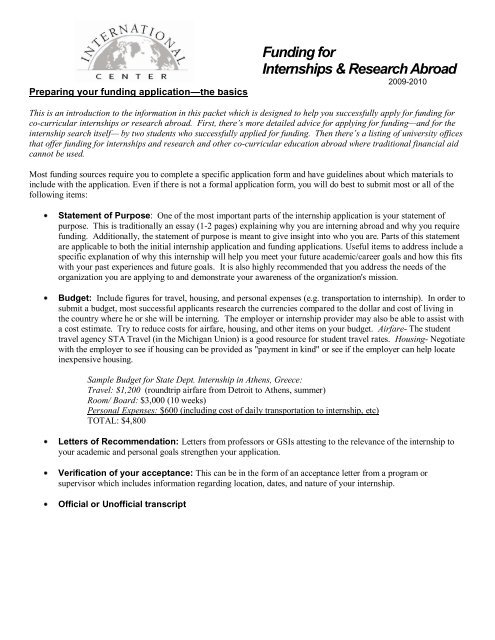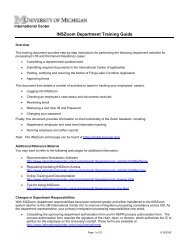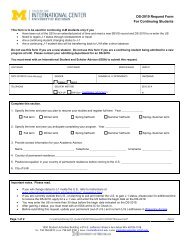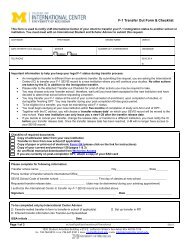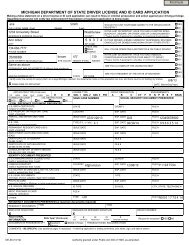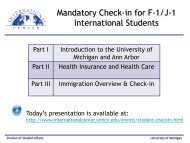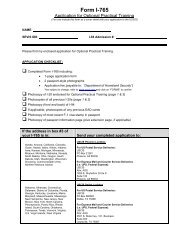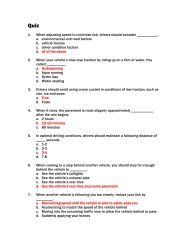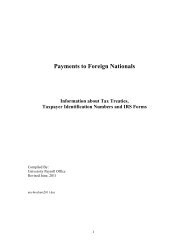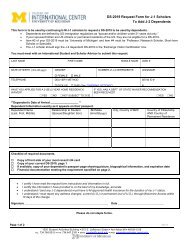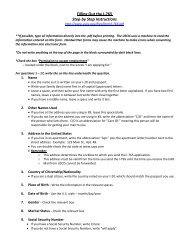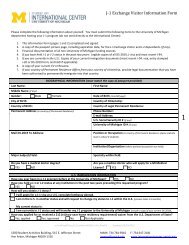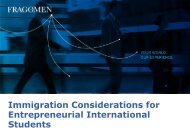Workshop Handout-Internship Funding - International Center
Workshop Handout-Internship Funding - International Center
Workshop Handout-Internship Funding - International Center
Create successful ePaper yourself
Turn your PDF publications into a flip-book with our unique Google optimized e-Paper software.
Preparing your funding application—the basics<br />
<strong>Funding</strong> for<br />
<strong>Internship</strong>s & Research Abroad<br />
2009-2010<br />
This is an introduction to the information in this packet which is designed to help you successfully apply for funding for<br />
co-curricular internships or research abroad. First, there’s more detailed advice for applying for funding—and for the<br />
internship search itself— by two students who successfully applied for funding. Then there’s a listing of university offices<br />
that offer funding for internships and research and other co-curricular education abroad where traditional financial aid<br />
cannot be used.<br />
Most funding sources require you to complete a specific application form and have guidelines about which materials to<br />
include with the application. Even if there is not a formal application form, you will do best to submit most or all of the<br />
following items:<br />
Statement of Purpose: One of the most important parts of the internship application is your statement of<br />
purpose. This is traditionally an essay (1-2 pages) explaining why you are interning abroad and why you require<br />
funding. Additionally, the statement of purpose is meant to give insight into who you are. Parts of this statement<br />
are applicable to both the initial internship application and funding applications. Useful items to address include a<br />
specific explanation of why this internship will help you meet your future academic/career goals and how this fits<br />
with your past experiences and future goals. It is also highly recommended that you address the needs of the<br />
organization you are applying to and demonstrate your awareness of the organization's mission.<br />
Budget: Include figures for travel, housing, and personal expenses (e.g. transportation to internship). In order to<br />
submit a budget, most successful applicants research the currencies compared to the dollar and cost of living in<br />
the country where he or she will be interning. The employer or internship provider may also be able to assist with<br />
a cost estimate. Try to reduce costs for airfare, housing, and other items on your budget. Airfare- The student<br />
travel agency STA Travel (in the Michigan Union) is a good resource for student travel rates. Housing- Negotiate<br />
with the employer to see if housing can be provided as "payment in kind" or see if the employer can help locate<br />
inexpensive housing.<br />
Sample Budget for State Dept. <strong>Internship</strong> in Athens, Greece:<br />
Travel: $1,200 (roundtrip airfare from Detroit to Athens, summer)<br />
Room/ Board: $3,000 (10 weeks)<br />
Personal Expenses: $600 (including cost of daily transportation to internship, etc)<br />
TOTAL: $4,800<br />
Letters of Recommendation: Letters from professors or GSIs attesting to the relevance of the internship to<br />
your academic and personal goals strengthen your application.<br />
Verification of your acceptance: This can be in the form of an acceptance letter from a program or<br />
supervisor which includes information regarding location, dates, and nature of your internship.<br />
Official or Unofficial transcript
2<br />
Tips and Resources for Finding an <strong>International</strong> <strong>Internship</strong><br />
By Sara Schmidt, Graduate Student Advisor, <strong>International</strong> <strong>Center</strong><br />
Things to Consider<br />
What region of the world do you want to work in?<br />
What population do you want to work with?<br />
Do you have a specific project or research topic that you are set on doing, or are you open to different types of<br />
projects that the organization may have available to you?<br />
How long do you have available for your internship?<br />
Does your program require specific activities or objectives be carried out, or do you have complete flexibility?<br />
What languages are required to work in the area you are interested in? What languages are most useful?<br />
Tips for Finding an <strong>Internship</strong><br />
Check with professors in your program who work internationally. Even if they don’t do the exact type of work<br />
you are thinking of doing, they can often direct you to someone who does.<br />
Talk to the office of student services in your department to see if there are any previous students who worked in<br />
the area/field you are interested in, and see if you can contact them for more information.<br />
Check out formal internship programs, even if you don’t initially think you are eligible. There are many here at<br />
U of M as well as national options, and many of these programs help with funding. Also, look at departments at<br />
other universities, which may have additional resources you are not familiar with.<br />
Words of Wisdom<br />
Start early. Do your research and start contacting professors and organizations in advance. This will give you<br />
time to find the organization or program that is the best fit for your skills, interests, and availability. You may also<br />
need to start the immunization process several months before departing.<br />
Be both patient and assertive. Many organizations you may be interested in working for do not plan their<br />
summer internships in December, yet this may be when you need to start applying for funding. Once you’ve<br />
found an internship, allow plenty of time to receive any documents or verification, and provide appropriate<br />
reminders to your contact at the organization.<br />
Be flexible, but communicate your expectations. Things are bound to change a lot on the ground in the country<br />
you plan to work in, and if you aren’t prepared you may be surprised to find things not nearly as you expected.<br />
However, it is also important to discuss your expectations of the organization and theirs of you in advance.<br />
Sell your strengths. Many organizations without formal intern programs may not want to take on an intern if they<br />
don’t see how it will benefit their work. In your resume and cover letter, highlight your skills and experience that<br />
will be of benefit to the organization. Not only do you want to gain personally and professionally from your<br />
experience, but you want the organization to benefit from your presence as well.<br />
Follow instructions on applications. For both formal and informal applications (including funding applications),<br />
make sure that you have all of the requested documents, all parts of the application are complete and within<br />
page/word limits, and you have submitted by the date and time deadline.<br />
Go prepared. It is useful to bring a map and a guidebook with you, and to see if you can secure a contact in the<br />
region before departing.<br />
Useful Links for Finding <strong>Internship</strong>s<br />
All U-M Career Services – the Career <strong>Center</strong> (http://www.careercenter.umich.edu) & the career offices of U-M<br />
Schools & Colleges. Assistance with resumes, cover letters, job and internship listings and employer visits.<br />
http://www.ii.umich.edu, U-M <strong>International</strong> Institute – <strong>Funding</strong> resources; the II’s Area Studies <strong>Center</strong>s are a<br />
key to experts in world regions, visiting scholars, lectures and conferences on current events.<br />
http://www.internationalcenter.umich.edu/swt, U-M <strong>International</strong> <strong>Center</strong> website, with information and<br />
resources on all aspects of working and interning abroad, including: funding for international internships and<br />
research; international opportunities for information professionals (SI students); international social work; and<br />
international careers and internships in U.S. government affairs.<br />
http://www.msuglobalaccess.net, Michigan State University’s portal to resources and other websites is searchable<br />
by country/region, theme, constituency group, or resource type.
3<br />
Undergraduate <strong>Funding</strong> Tips<br />
By Anna Lembryk, Peer Advisor, UM <strong>International</strong> <strong>Center</strong><br />
Undergraduates can and do get funded!!! There are many scholarships and grants that are only open to<br />
undergraduate students. Many of them are available right here on campus.<br />
Most scholarship applications ask you to write a proposal. The most common questions seem to be:<br />
How will the experience benefit your future career?<br />
What do you expect to gain from the experience?<br />
How will this experience help you academically?<br />
Why do you want to work abroad?<br />
Tips<br />
Do put effort into answering these questions. Answering questions like these will not only make writing your<br />
proposal easier but it will help you gain an understanding of what you want to do after graduation.<br />
Start early. Just because you may think you know what you want to write about does not mean that it will be easy<br />
to put that into writing. Also, have at least one person proofread your proposal. It helps if one person knows about<br />
your interests and the other does not. The first can ensure that you wrote what you intended and the other that it<br />
all makes sense. It is very easy to forget to explain something that is second nature to you. Talking about your<br />
interests and what you expect from the summer will help you brainstorm ideas and give you a clearer picture of<br />
what you want to do.<br />
Follow all instructions. The LSA Scholarship requests that you do not staple the paper work. You could use a<br />
large envelope instead. Check the deadlines for applications.<br />
Learn about the organization you will be working for and incorporate that into your proposal. If you do not have a<br />
placement yet, you can write about the placement program. Also, read up on the institution whose scholarship you<br />
are applying for. You are trying to convince them to give you money; they want you to know about them.<br />
Once you have a basic proposal, you should be able to use the ideas for most of your applications. You will likely<br />
have to tailor it to answer specific questions but you will not have to start from scratch each time you have to<br />
write a proposal. But be careful about copying and pasting together a new proposal, it might not come out the way<br />
you want. Do proofread it yourself and have someone else read it too.<br />
Keep all relevant information in one place. Have a folder for each scholarship/grant you are applying for and<br />
write the deadlines in an obvious place.<br />
Check all requirements before you apply and after you receive the scholarship. Some institutions require that you<br />
write a paper about your experience or a thank you note for the donors.<br />
Ask the organization you will be working for if they provide anything. Do they provide lunches or pay for<br />
transportation? Will they provide housing?<br />
If you have questions, don’t be intimidated to call or email the organization. Submitting the proper paperwork on<br />
time could make a difference between receiving the scholarship or not.<br />
Department funding: Ask your concentration department if they have any funding. Sometimes departments do<br />
not publicize their scholarships and grants, so it is always worth asking. Also, the internship or research program<br />
that you are going through may also have a scholarship fund. Don’t hesitate to apply for smaller scholarships, the<br />
money adds up and they may be less competitive than some of the large grants funded by the university.<br />
Talk to your professor or concentration advisor they may know of a scholarship offered for your specific field.<br />
Check sites like FastWeb for international internship funding.<br />
Check out the Graduate <strong>Funding</strong> sheet for more information.
4<br />
Tips for <strong>Funding</strong> Graduate <strong>International</strong> <strong>Internship</strong>s<br />
By Sara Schmidt, Graduate Student Advisor, UM <strong>International</strong> <strong>Center</strong><br />
The process of pursuing an international internship can seem overwhelming. The attached sheet, Tips and Resources for<br />
Finding an <strong>International</strong> <strong>Internship</strong>, can help with securing a placement. Knowing that an overseas placement is an<br />
expensive endeavor, many students are hesitant to secure the internship before they know that they have funding to pay<br />
for it. However, it is almost always necessary to have an internship established before you apply for funding. The good<br />
news is that most funding deadlines are in February and March, allowing you enough time to set up an internship<br />
beforehand. The following tips will help you prepare for the funding search.<br />
Get organized. Make a list of all funding sources you are applying for. Include due dates, what documents the application<br />
requires, and any notes you have from information sessions about the award.<br />
Start early. <strong>Funding</strong> applications may have due dates early in the winter semester, and many applications may be due at<br />
nearly the same time. Starting early not only allows you to prepare a high-quality statement of purpose, but also gives you<br />
enough time to gather the documents you will need to submit.<br />
Be creative. Explore your options for funding from areas you wouldn’t normally think of. See if there is a way for you to<br />
incorporate projects outside of your original scope into your internship in order to be eligible for additional funding.<br />
Follow instructions. Make sure that you have all of the requested documents, all parts of the application are complete and<br />
within page/word limits, and that you submit by the date and time deadline.<br />
Keep copies. Keep copies of all the materials you submit. Not only does this serve as a record of what you’ve done in case<br />
anything gets lost, but you will likely use the same basic documents for each of your applications.<br />
Components of the <strong>Funding</strong> Application.<br />
Each funding application will be a little different, but will for the most part be composed of the same basic documents.<br />
Tips for completing each section are outlined below.<br />
Cover Letter. This is the first page of your application and should always be included. It serves to thank the organization for the<br />
opportunity to apply for funding and outlines what is included in your application as well as what documents may be missing. It<br />
also includes your contact information should the funder need to get in touch with you for any reason. Finally, it should be<br />
addressed to a specific person who is responsible for receiving applications.<br />
Application Form. Some funders require a separate application form, which usually asks for basic information from the<br />
applicant, such as degree program and year. It may also include short-answer questions about the proposed project.<br />
Statement of Purpose. Since most funding sources do not conduct interviews, this is usually the most important piece of your<br />
application because if gives you an opportunity to “talk” to the funders. The application will tell you what should be included and<br />
how long it should be – follow these instructions completely and accurately. This typically includes a description of the<br />
organization you plan to work for, what type of work you would be doing, how it will enhance your academic and personal goals,<br />
and why funding is being sought. Talk with people you trust and have them review your essay to make sure it is clear, answers<br />
specific questions, and accurately represents your goals and intentions for the internship.<br />
Budget and Budget Narrative. The budget should include figures for roundtrip air travel, local transportation, housing, food,<br />
immunizations, travel visa(s) and travel medical insurance. Each item should be based on real figures, which is explained in the<br />
budget narrative. Most applications will also ask what other funding sources you have applied to and received, and this should be<br />
included. Your total budget will probably be greater than the amount of the award you are applying for, so it is essential to apply<br />
for more than one award.<br />
Letters of Recommendation. This should be written by a professor or academic advisor who is familiar with your work interests<br />
and ability to carry out the proposed internship. To make this easier for the reference, request the letter at least six weeks before<br />
the letter is needed, and if you need multiple letters from the same professor for different applications request them all at once.<br />
Provide her or him with a copy of your CV, a personal statement, and the requirements for the letter, as defined by the funder.<br />
Letter of Invitation. This is some sort of verification that you are indeed accepted as an intern at the organization where you<br />
intend to work. It should include a statement of what you will be doing, the dates you will be working, and any funding (including<br />
in-kind) you will receive from the organization. An email is usually sufficient – check with the funder to confirm. It is important<br />
to ask for this from the agency as soon as possible so you have it for the application.<br />
Resume or CV. Make sure it is up to date and highlights your experience and skills most relevant to the position you have<br />
applied for, such as past international experience, language ability, and related coursework. Also, have someone proofread your<br />
resume or CV – career center counselors are a great resource.<br />
Transcripts. Official or unofficial transcripts may be required. Wolverine Access allows you to view and print unofficial copies<br />
and place orders for official copies. Make sure to review your transcript to check for any errors.
5<br />
Schmidt – Budget<br />
Budget<br />
Note: The estimates below are based on a start date of May 2, 2007 and an end date of August 29, 2007, a total<br />
of four months (120 days).<br />
ANTICIPATED MONTHLY EXPENSES<br />
Rent…………………………………………………………….…$250<br />
Utilities……………………………………………….……….……$50<br />
Food…………………………………………………………….…$150<br />
Local Transportation.................................................................…....$40<br />
Monthly Expenses…………………………………………….…$490<br />
Subtotal Monthly Expenses (multiplied by four months)…...$1960<br />
ANTICIPATED ONE-TIME EXPENSES<br />
Transportation To and From Site………………………………...$1805<br />
Immunizations and Medical Preparation……………………….…$440<br />
Travel Visa…………………………………………………........…$50<br />
Travel/Medical Insurance………………………………………....$290<br />
Subtotal Additional One-Time Expenses……………………...$2585<br />
Total Expenses (Monthly Expenses + One-Time Expenses)………………………….$4545<br />
FUNDING FROM OTHER SOURCES<br />
Personal Contribution…………………………………………….$500<br />
Other Grants and Fellowships……………………………………unknown at this time*<br />
Total <strong>Funding</strong>…………………………………………………………………………….$500<br />
TOTAL UNMET NEED………………………………………………………………..$4045<br />
*Please see Budget Justification on the following pages
6<br />
Schmidt – Budget Justification 1<br />
ANTICIPATED MONTHLY EXPENSES<br />
Rent $250 Amount is based on Internet research and discussions with sponsoring<br />
professor.<br />
Utilities $50 Amount is based on Internet research and discussions with sponsoring<br />
professor.<br />
Food $150 Calculated at $5 per day for 30 days per month. Amount is based on<br />
Internet research.<br />
Local<br />
Transportation<br />
Monthly<br />
Total<br />
$40 Calculated at $10 per week for four weeks per month. Amount is based<br />
on Internet research.<br />
$490<br />
TOTAL $1960 Monthly total multiplied by four months.<br />
ANTICIPATED ONE-TIME EXPENSES<br />
Transportation<br />
To and From<br />
Site<br />
$1805 Roundtrip airfare from Phoenix, Arizona, to Kisumu, Kenya. Total<br />
cost combines flight from Phoenix to Nairobi ($1625, British<br />
Airways) and Nairobi to Kisumu ($180, Kenyan Airways). Amounts<br />
are lowest-cost student travel rates.<br />
Immunizations<br />
and Medical<br />
Preparation<br />
$440 Amount is based on immunization and travel costs, posted on the<br />
University of Michigan’s Travel Health Clinic website:<br />
Nurse visit $30<br />
Malaria Tablets $120 ($1 per day for 120 days)<br />
Typhoid $78<br />
Yellow Fever $112<br />
Hepatitis A $47<br />
Polio Booster $53<br />
Travel Visa $50 Tourist visa required for United States citizens entering Kenya is<br />
purchased upon entry for a cost of $50.<br />
Travel/Medical $290 Amount is based on STA student insurance rate for a trip length longer<br />
Insurance<br />
than 90 days.<br />
TOTAL $2585<br />
GRAND<br />
TOTAL<br />
$4545 Sum of Monthly Expenses and One-Time Expenses.
7<br />
Schmidt – Budget Justification 2<br />
FUNDING FROM OTHER SOURCES<br />
Personal $500 I anticipate being able to contribute $500 from my savings over the<br />
course of the summer.<br />
William<br />
Davidson<br />
Institute<br />
Travel Grant<br />
$1000 Pending. Application was submitted for review February 12 th , 2007.<br />
Raoul<br />
Wallenberg<br />
<strong>International</strong><br />
Travel<br />
Fellowship<br />
Graduate<br />
Global<br />
Health Travel<br />
Fellowship<br />
Up to<br />
$2000<br />
Up to<br />
$3000<br />
Pending. Application was submitted for review February 16 th , 2007.<br />
Pending. Application was submitted for review March 6 th , 2007.<br />
<strong>International</strong><br />
Institute<br />
Travel<br />
Fellowship<br />
TOTAL<br />
$1000 Applications will be submitted for review; applicant was not selected<br />
for a fellowship.<br />
unknown The total amount received from other sources will depend on the<br />
outcome of the several applications that have been and will be<br />
submitted in the coming months.<br />
TOTAL UNMET NEED<br />
TOTAL $4045 Amount is the differences between total expenses and additional<br />
funding, and represents current unmet need.<br />
Note: Great Lakes University and TICH are unable to provide any financial support for this internship.
8<br />
Where to look: Campus resources for Undergraduates<br />
Financial Aid / Scholarships for undergraduate study abroad<br />
If you are receiving academic credit for your internship or service-learning program, it is possible that financial aid can<br />
be used to assist with funding. Check with the Financial Aid Office for more information. Here are some examples of<br />
study-internship / service-learning programs:<br />
U-M’s Office of <strong>International</strong> Programs (OIP) offers internships with some of their study abroad programs --<br />
see http://www.lsa.umich.edu/oip<br />
U-M’s Global Intercultural Experience for Undergraduates (GIEU) program offers faculty-led summer<br />
programs in which students are paid as interns; apply by early November for following Spring/Summer – see<br />
www.gieu.umich.edu<br />
Some study-internship & service-learning programs offer scholarships for their own programs.<br />
<strong>Funding</strong> for co-curricular (not-for-credit) internships, volunteering & research abroad<br />
Your own U-M School or College may offer funding even if there is not a formal application. In the case of LSA,<br />
for example, the process requires that you submit a resume, statement of intent, proposed budget, and proof of<br />
acceptance. Contact Mr. Doug Fletcher by email (douglasf@umich.edu) or phone 764-0324 – and see:<br />
http://www.lsa.umich.edu/students/scholarships<br />
Scroll down to Spring/Summer Terms and the “LSA Opportunity Scholarship Program”.<br />
Your school’s international office, if it has one (e.g. <strong>International</strong> Programs in Engineering; LSA’s Office of<br />
<strong>International</strong> Programs; Art & Design; Ross School of Business CIBE).<br />
Your Concentration's Department. U-M Departments may have funding available for students who can show that<br />
the internship or research is related to their academic coursework.<br />
Foreign Language Departments may offer grants for undergraduates – even to non-majors -- who will be doing an<br />
internship in a language taught by the Department (examples: Department of Germanic Languages; Romance<br />
Languages; Modern Greek/Classics).<br />
<strong>Center</strong> for the Education of Women, http://www.umich.edu/~cew/students/stures.htm<br />
Student Research Grants of up to $750 for those doing research on women’s issues – e-mail Susan Kaufmann at<br />
Kaufmann@umich.edu for information.<br />
The Ginsberg <strong>Center</strong> has a number of grants for individuals or groups doing internships or research with a service,<br />
social justice or “community-based” focus. See http://ginsberg.umich.edu/resources/for_students.html#fellowships<br />
(click on Fellowships as well as Student Resources). Application deadlines are in February and March.<br />
University of Michigan <strong>Center</strong> for Global Health, tel.647-7648, e-mail cghprograms@umich.edu.<br />
University of Michigan students are eligible to participate in the work of the <strong>Center</strong> for Global Health (CGH, <strong>Center</strong>)<br />
as Student Associates. Any full-time undergraduate, graduate, or medical student interested in global health may<br />
apply for CGH student association. Membership involves a one-year commitment of service to the <strong>Center</strong> for Global<br />
Health and offers eligibility to benefits particular to <strong>Center</strong> Student Associates and relevant to the <strong>Center</strong>'s vision.<br />
Such benefits include programmatic funding for conferences, speakers, global health engagement and global health<br />
scholarly research.<br />
See: http://www.globalhealth.umich.edu/studentassociation.html<br />
The <strong>International</strong> Institute offers grants for undergraduates through the <strong>International</strong> Institute’s Fellowship<br />
program. The application deadline is early in the winter term (mid-February). Visit the <strong>International</strong> Institute's<br />
website for more information, which lists many funding sources to support undergraduate internships and research<br />
abroad -- http://www.ii.umich.edu (click on <strong>Funding</strong>)<br />
Area Studies <strong>Center</strong>s (within the <strong>International</strong> Institute), http://www.ii.umich.edu<br />
--Listings of specialized grants via websites and e-mail lists<br />
--Some <strong>Center</strong>s offer formal grant programs (e.g. <strong>Center</strong> for European Studies grants for Western Europe, <strong>Center</strong> for<br />
Russian & East European Studies CRIF & Weiser grants for Europe; <strong>Center</strong> for South Asian Studies India summer<br />
grant). Other <strong>Center</strong>s may consider individual funding requests.<br />
The Minority Health & Health Disparities <strong>International</strong> Research Training Program (MHIRT), offers fullyfunded<br />
research opportunities in Chile, China, Jamaica, Ghana and South Africa for undergraduates who have<br />
“demonstrated interest and commitment to research in health inequalities.” For more information contact Temuulen<br />
Johnson at temuulen@umich.edu or tel. 764-0679 and see: http://www.chgd.umich.edu .
9<br />
Examples of Specific Schools or Colleges (Undergraduates):<br />
The Honors College: For Honors College students, this is also a resource for travel and research grants for<br />
undergraduates. Applications are required. Some have specific deadlines and others are accepted on a rolling basis. For<br />
more information, please visit the Honors Program website:<br />
http://www.lsa.umich.edu/honors/currentstudents/scholarshipinformation .Rewards are usually processed through<br />
reimbursement.<br />
The Residential College: For RC students, the Residential College offers an internship award that can be applied toward<br />
living expenses, travel, etc. Students are expected to share their experiences with the RC community upon their return.<br />
There are usually three awards per year ranging from $750-$1000. For further inquiries, please visit the RC Main Office.<br />
Graduate Student <strong>Funding</strong> Opportunities<br />
Your School or College (funding is only for students in the specific degree program -- some examples):<br />
o Ford School of Public Policy: Graduate Career Services Office, Tel. 764-8076.<br />
o Law School: <strong>Center</strong> for <strong>International</strong> & Comparative Law, wls@umich.edu, Tel. 764-0535.<br />
o Ross School of Business: <strong>Center</strong> for <strong>International</strong> Business Education, www.umich.edu/~cibe, tel. 936-3917.<br />
o School of Information: Judy Lawson jmlawson@umich.edu (Director of Academic & Career Services) or<br />
Xiao Wen Zou zxwen@umich.edu (Academic/Financial Aid Advisor).<br />
o School of Public Health: Career Services, Shelagh Saenz, swilcox@mail.umich.edu – note that specific<br />
degree tracks within SPH offer their own funding.<br />
o School of Social Work: Assistant Dean for Student Services Tim Colenback, timot@umich.edu ..<br />
Your department or degree program may offer funding.<br />
<strong>International</strong> offices within your School or College (e.g. <strong>International</strong> Programs in Engineering).<br />
Professors, who may have funding for research projects.<br />
U-M Offices Which May Have <strong>Funding</strong> for Graduate Students<br />
<strong>Center</strong> for the Education of Women, http://www.umich.edu/~cew/students/stures.htm<br />
Student Research Grants of up to $750 for those doing research on women’s issues – e-mail Susan Kaufmann at<br />
Kaufmann@umich.edu for information.<br />
The Ginsberg <strong>Center</strong> has a number of grants for individuals or groups doing internships or research with a service,<br />
social justice or “community-based” focus. See http://ginsberg.umich.edu/resources/for_students.html#fellowships<br />
(click on Fellowships as well as Student Resources). Application deadlines are in February and March.<br />
University of Michigan <strong>Center</strong> for Global Health, tel.647-7648, e-mail cghprograms@umich.edu.<br />
University of Michigan students are eligible to participate in the work of the <strong>Center</strong> for Global Health (CGH, <strong>Center</strong>)<br />
as Student Associates. Any full-time undergraduate, graduate, or medical student interested in global health may<br />
apply for CGH student association. Membership involves a one-year commitment of service to the <strong>Center</strong> for Global<br />
Health and offers eligibility to benefits particular to <strong>Center</strong> Student Associates and relevant to the <strong>Center</strong>'s vision.<br />
Such benefits include programmatic funding for conferences, speakers, global health engagement and global health<br />
scholarly research.<br />
See: http://www.globalhealth.umich.edu/studentassociation.html<br />
<strong>International</strong> Institute, tel. 764-3297, http://www.ii.umich.edu<br />
--<strong>International</strong> Institute Fellowships (for internships, research, theses, dissertations; available for all students,<br />
including non-U.S. citizens)<br />
--IIE-Fulbright and Fulbright-Hays Fellowships<br />
--Luce Fellowships for post-graduate internships in Asia (apply by November 1).<br />
--Most comprehensive listing of all U-M funding sources for international educational activities<br />
Area Studies <strong>Center</strong>s (within the <strong>International</strong> Institute), tel. 763-9200 http://www.ii.umich.edu
10<br />
--US/ED Foreign Language and Area Studies Fellowships (FLAS)<br />
--Listings of specialized grants via websites and e-mail lists<br />
--Some <strong>Center</strong>s offer formal grant programs (e.g. <strong>Center</strong> for Afroamerican & African Studies Moody Grants; <strong>Center</strong><br />
for European Studies grants and <strong>Center</strong> for Russian & East European Studies CRIF & Weiser grants for Europe.<br />
Other <strong>Center</strong>s may consider individual funding requests.<br />
Foreign Language Departments (see undergraduates section)<br />
The CDS Program (in the Department of Germanic Languages) offers summer internship placements in Germany,<br />
Spain and Argentina, and also has two programs for students who have an advanced degree: the Bosch Fellowship in<br />
Germany (apply by October 15) and the Alfa Fellowship in Russia (apply in December). Contact Peggy<br />
Wunderwald-Jensen, pwjensen@umich.edu, tel. 615-6336 and see: http://www.cdsintl.org/fromusa .<br />
The Minority Health & Health Disparities <strong>International</strong> Research Training Program (MHIRT), offers fullyfunded<br />
research opportunities in Chile, China, Jamaica, Ghana and South Africa for medical & graduate students who<br />
have “demonstrated interest and commitment to research in health inequalities.” For more information contact<br />
Temuulen Johnson at temuulen@umich.edu or tel. 764-0679 and see: http://www.chgd.umich.edu .<br />
Nonprofit and Public Management <strong>Center</strong>, tel. 763-4214,<br />
http://nonprofit.umich.edu/students<br />
For Business School, Ford School and Social Work graduate students only, who will be serving an internship with a<br />
nonprofit or public organization. NPM also offers doctoral research grants.<br />
Rackham Fellowships Office, tel. 764-8119, http://www.rackham.umich.edu/financial_assistance.<br />
--Fellowships for students in Rackham graduate degree programs<br />
--DAAD Scholarships for Germany<br />
--Lurcy Scholarships for France<br />
William Davidson Institute -- Student Projects & <strong>Internship</strong>s, Kelly Dunham, ,<br />
http://www.wdi.umich.edu/Resources/StudentProjects<br />
Offers several grant & internship programs for graduate students. Some are open to all graduate students while<br />
others are for MBA students. Example: Global Impact <strong>Internship</strong> (open to all graduate students) offers funding of<br />
up to $5,000; application deadline is in February.<br />
Fundraising (off-campus):<br />
-Rotary Club, Kiwanis, ethnic/religious organizations, family and friends<br />
It is often possible to approach your local Rotary, Lions, Kiwanis, etc. club and offer to do a presentation about your<br />
internship for them instead of just writing a request for funding. Usually these types of clubs are very interested in having<br />
speakers present at their meetings and enjoy establishing a relationship with the people they are funding. It would also be<br />
to your advantage to offer to present again upon your return from the internship in order to assure them that their money<br />
has been put to good use. Specifically for Rotary Clubs, offering to attend a Rotary meeting in the country where you will<br />
be interning would be extremely beneficial. Presenting your internship in front of religious organizations as well as in<br />
front of family members and friends is also a good way to inform them of your goals and to give them a sense of investing<br />
in your education as opposed to just giving you money. Two websites that have excellent general suggestions for<br />
fundraising are:<br />
American Medical Students Association, http://www.amsa.org/global/ih<br />
WorldTeach, http://www.worldteach.org/program_information/fundraising.html<br />
Additional Resources for Finding External <strong>Funding</strong><br />
U-M <strong>International</strong> <strong>Center</strong>’s Website – Evaluates websites and books; includes sections for grants, region-specific and<br />
profession-specific -- http://www.internationalcenter.umich.edu/swt/<br />
U-M Rackham Fellowships Office -- http://www.rackham.umich.edu/financial_assistance<br />
IIE Passport: Study Abroad <strong>Funding</strong> -- http://www.studyabroadfunding.org/<br />
These books listing external funding opportunities are available at the <strong>International</strong> <strong>Center</strong>:<br />
Financial Aid for Research and Creative Activities Abroad 2006-2008 edited by Gail Ann Schlachter 2006. 388 pp.<br />
$45 plus $6 shipping from Reference Service Press, www.rspfunding.com. Lists around 1,000 funding sources<br />
available to support research, professional development, teaching assignments, or creative activities (relatively few<br />
listings for undergraduates). Indexes for level of study, location, and subject.
11<br />
Financial Aid for Study and Training Abroad 2006-2008 edited by Gail Ann Schlachter. 2006. 354 pp. $39.50 plus $6<br />
shipping from Reference Service Press, www.rspfunding.com. Lists around 1,000 funding sources available to<br />
support formal educational programs such as study abroad, training, internships, workshops, or seminars. This is the<br />
most up-to-date and comprehensive directory of scholarships for study abroad currently available.<br />
<strong>Internship</strong><strong>Funding</strong>09 / 9-2008 / W NOLTING<br />
University of Michigan <strong>International</strong> <strong>Center</strong><br />
603 E. Madison Street, Ann Arbor, MI 48109-1370, Phone (734) 647-2299<br />
http://www.internationalcenter.umich.edu/swt
13<br />
Statistics for Education Abroad at the University of Michigan<br />
For academic year 2005-2006 and summer 2006<br />
Compiled by William Nolting, Overseas Opportunities Office, U-M <strong>International</strong> <strong>Center</strong><br />
Study Abroad<br />
Study abroad statistics cited<br />
here are from the Institute of<br />
<strong>International</strong> Education, and<br />
include only programs for<br />
academic credit – see<br />
www.opendoorsweb.org.<br />
U-M programs / non U-M programs<br />
1290 (952 undergraduates & 338<br />
graduate) U-M students study through<br />
U-M-sponsored programs (OIP,<br />
GIEU, Engineering, Business, Law).<br />
An additional 411 U-M students<br />
studied through non-U-M programs,<br />
most with assistance from the<br />
Overseas Opportunities Office.<br />
* = Participants primarily recent graduates (in table below)<br />
Co-curricular internships, Location(s) / focus<br />
research & work abroad<br />
Number of U-M<br />
students<br />
1701<br />
U-M students<br />
studied abroad in<br />
2005-06. Total<br />
includes students<br />
on both U-M and<br />
non-U-M<br />
programs.<br />
Number of U-M<br />
students<br />
U-M College of Engineering Worldwide - engineering 46 (44U + 2G)<br />
U-M CJS Japan 2 G<br />
U-M CREES Eastern Europe 36 (9U + 27G)<br />
U-M CSEAS & CSAS South & Southeast Asia 20 (11U + 9G)<br />
U-M Ford School Worldwide – public policy 20 G<br />
U-M Global Health (GHRT) Health research 21 (9U + 12G)<br />
U-M Int’l Institute Fellowships Worldwide, all disciplines 145 (11U + 134G)<br />
U-M MHIRT (NIH-funded) 5 countries, health research 25 (17U + 8G)<br />
U-M Medical School Worldwide - medical 65 G<br />
U-M Ross School Worldwide - business 20 G<br />
U-M School of Law Worldwide - law 25 G<br />
U-M School of Nursing Worldwide - nursing 6 (3U + 3G)<br />
[SUBTOTAL UM-Sponsored] [431 (104U + 327G)]<br />
AIESEC (UM student org.) 80+ countries / business 27<br />
BUNAC<br />
UK only (total higher) / work<br />
24<br />
exchange<br />
CDS (affil. UM Germanic Germany / internships & fellowships 23<br />
Languages Dept)<br />
CIEE Teach abroad 6<br />
Cross-Cultural Solutions Volunteer/internships (Afr/Asia/LA) 13<br />
Francophone <strong>Internship</strong>s-UM Romance Languages (Rachel Criso) 10<br />
* France Teaching Asst. French Govt. Teaching Program 22<br />
* Fulbright (IIE--U-M Int’l Inst) 110+ countries / grants & TESL 29<br />
IAESTE (UM student org.) 80+ countries / engin + science 3<br />
Int’l Cooperative Educ Ger,Switz, Belg, China / placements 15<br />
* JET Japanese Govt. Teaching Program 6<br />
* Peace Corps 90+ countries (2-yr.) / various 80<br />
Quito Project-UM student org health volunteering in Ecuador 39<br />
U.S. State Dept worldwide / U.S. Govt. Dipl. Intern. 29<br />
Volunteers for Peace Short-term worldwide 24<br />
U-M participants in other cocurricular<br />
Count by Int’l Ctr from data supplied +19 (minimum est.)<br />
programs<br />
by participants and programs<br />
[SUBTOTAL Other programs] [369]<br />
Total U-M students in cocurricular<br />
800 (minimum est.)<br />
education abroad<br />
(Add from top box) (U-M students studying abroad) +1701<br />
Total U-M students<br />
participating in education<br />
abroad, 2005-06<br />
Of the overall total, 1211 students<br />
participated in co-curricular or non-<br />
UM study abroad<br />
2501 (minimum est.)<br />
National total<br />
US students<br />
studying abroad<br />
2005-06<br />
(most recent<br />
available data)<br />
223,534 (IIE)<br />
(U =undergraduate<br />
G = graduate /<br />
professional<br />
students)


